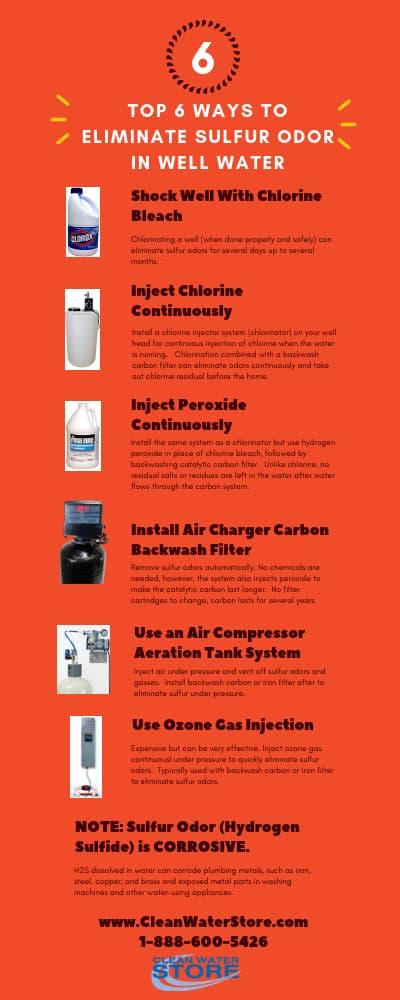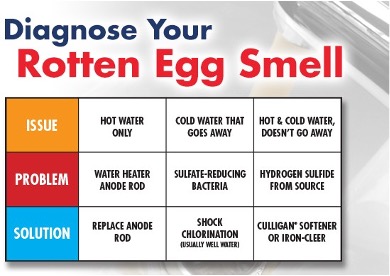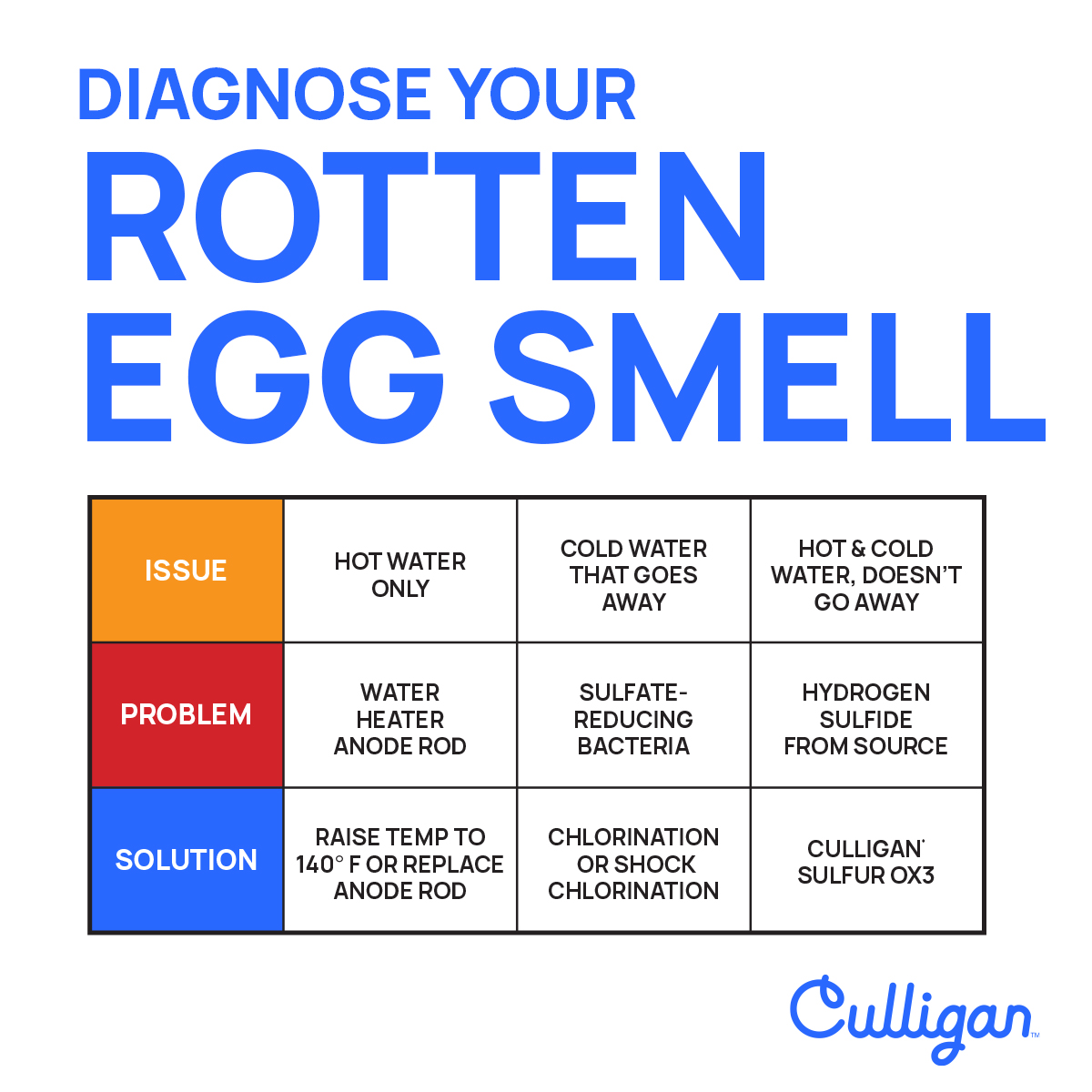Have you ever turned on your faucet only to be greeted by an unpleasant odor that reminds you of rotten eggs? If so, you’re not alone, and it’s something you shouldn’t ignore.
This foul smell can transform your kitchen or bathroom into a place you’d rather avoid. But why does this happen, and what can you do about it? Understanding the source of the problem is crucial, and knowing how to tackle it can save you from unnecessary stress and potential health risks.
Stick with us as we delve into the reasons behind this unsettling smell and explore effective solutions to bring freshness back to your water. Your senses—and your peace of mind—will thank you.

Credit: www.cleanwaterstore.com
Causes Of Rotten Egg Smell In Water
Ever turned on your tap and noticed a smell like rotten eggs? You’re not alone. This unpleasant odor can make drinking water a challenge. Understanding the causes is key to solving this issue. Several factors contribute to this smell in water systems.
Hydrogen Sulfide Presence
Hydrogen sulfide is a gas. It often causes water to smell like rotten eggs. This gas forms naturally. It’s found in groundwater or wells. Sulfur bacteria produce it in low-oxygen environments. The presence of hydrogen sulfide in water can be detected by its distinct smell.
Bacterial Growth
Bacteria can grow in water systems. This growth sometimes leads to foul smells. Sulfur bacteria are the main culprits. They thrive in low-oxygen areas. They produce hydrogen sulfide as a byproduct. This results in the rotten egg odor.
Well Water Contamination
Well water often contains hydrogen sulfide. This is due to soil and rock interactions. Contamination can occur over time. Wells without proper seals are more vulnerable. Regular testing of well water is essential. It helps identify any sulfur presence.
Water Heater Issues
Water heaters can be a source of odor. Magnesium rods inside often react with water. This reaction produces hydrogen sulfide gas. The gas leads to the rotten egg smell. Replacing the rod with an aluminum one may help. It can reduce the sulfur production.

Credit: culliganomaha.com
Identifying The Source
Have you ever turned on your tap and been greeted by the unpleasant smell of rotten eggs? This foul odor can be both alarming and frustrating. It’s often a sign that something is amiss with your water supply. Identifying the source of this stench is crucial for restoring your water to its natural, odorless state. Let’s dive into some practical steps to pinpoint the origin of the issue.
Testing Water For Contaminants
The first step in tackling the smelly water problem is testing for contaminants. Have you ever wondered what’s really swimming around in your glass? Testing kits are readily available and easy to use. They can detect sulfur, bacteria, and other culprits that might be causing the rotten egg smell. A simple test can reveal if hydrogen sulfide is the main offender. Imagine finding out that your water has hidden surprises!
Inspecting Plumbing Systems
Your plumbing system could be the root of the problem. Have you checked for any corrosion or leaks lately? These can contribute to unpleasant odors. Inspecting pipes for signs of rust or damage can be a revealing exercise. Even a small leak might be introducing contaminants into your water supply. Take a close look at any joints or fittings, and don’t forget to examine the areas around your faucets.
Analyzing Water Heater Conditions
Sometimes, the smell originates from your water heater. Do you know what’s lurking in there? Sediment buildup inside the tank can lead to stinky situations. Check the temperature settings—too low can encourage bacterial growth. Flushing the tank might be necessary to rid it of accumulated deposits. Could a simple clean-up be the answer to your odor woes?
By following these steps, you can determine the true source of that rotten egg smell. Addressing each potential issue methodically will help ensure your water is safe and pleasant to use once again. Have you identified the culprit in your home yet?
Health Implications
Water that smells like rotten eggs can be concerning. This unpleasant odor often indicates the presence of hydrogen sulfide or bacteria. Understanding the health implications is crucial. Consuming or using such water might pose health risks. Especially for vulnerable individuals, like children or the elderly.
Potential Risks Of Hydrogen Sulfide
Hydrogen sulfide is a gas that smells like rotten eggs. In small amounts, it may not harm health. But in higher concentrations, it can be dangerous. It can cause nausea, headaches, and dizziness. Long-term exposure might lead to more serious health issues. Monitoring water quality is essential.
Effects Of Bacteria In Drinking Water
Bacteria in water can be harmful. Some bacteria cause digestive problems. Symptoms might include stomach cramps and diarrhea. In severe cases, infection can occur. Children and those with weak immune systems are at higher risk. Ensure drinking water is safe and clean.
Short-term Solutions
Experiencing water that smells like rotten eggs can be unpleasant. Short-term solutions can help reduce odors until a permanent fix is found. These solutions are easy and effective for immediate relief.
Flushing The System
Flushing the system is a quick solution. Open all faucets and let water run for several minutes. This helps clear stagnant water. Running water can eliminate sulfur gas build-up. Try this method regularly for better results.
Using Activated Carbon Filters
Activated carbon filters are useful for removing odors. They trap impurities and gases in the water. Install these filters on taps or main water lines. They provide cleaner water and reduce bad smells. Regularly replace filters for best performance.
Temporary Water Treatment Options
Temporary water treatments can help. Chlorine bleach is a popular choice. Add a small amount to the water system. This kills odor-causing bacteria. Another option is hydrogen peroxide. It neutralizes sulfur gases. Both methods are effective but should be used with care.
Long-term Solutions
The smell of rotten eggs in water is not pleasant. It often indicates hydrogen sulfide gas. This can be a persistent issue. Short-term fixes may not be enough. Long-term solutions are needed for lasting relief. These solutions address the root causes.
Let’s explore effective methods to ensure your water is fresh and odor-free. Each method focuses on different aspects of water systems. By applying these solutions, you can enjoy clean, fresh-smelling water.
Installing Aeration Systems
Aeration systems can help remove hydrogen sulfide gas. They work by mixing air with water. This process releases the gas into the air. The gas then escapes, leaving the water odor-free. Installing aeration systems can be a permanent fix. They also improve water quality. They reduce other gases and minerals.
Regular Water Heater Maintenance
Water heaters can be a source of the smell. Bacteria sometimes grow inside the heater. This leads to hydrogen sulfide production. Regular maintenance can prevent this. Flushing the tank and checking the anode rod helps. This reduces bacteria growth. Regular inspections ensure the heater works efficiently.
Well Water Treatment Methods
Well water often has hydrogen sulfide. Treatment methods can reduce or remove it. Chlorination is one method. It kills bacteria that produce the gas. Activated carbon filters can also help. They remove odors and improve taste. Regular well inspections are important. They help identify and fix issues early.

Credit: tampaculligan.com
Preventive Measures
Water that smells like rotten eggs can be concerning. This smell usually comes from hydrogen sulfide gas. It can affect both the taste and quality of your water. Implementing preventive measures can help maintain water quality. These measures also ensure your water remains odor-free. Let’s explore some effective strategies.
Routine Water Testing
Regular water testing is essential for maintaining water quality. Testing helps detect harmful substances early. You can use home test kits for basic analysis. For comprehensive results, hire a professional. Ensure the test checks for hydrogen sulfide levels. Regular testing keeps your water safe and fresh.
Proper Well Construction
Well construction plays a key role in water quality. A well-constructed well prevents contaminants from entering. Ensure your well is built with durable materials. It should have a proper seal and casing. Regularly inspect the well cap for any damage. Good construction practices safeguard your water.
Regular Plumbing Inspections
Plumbing systems can contribute to the rotten egg smell. Corroded pipes might release hydrogen sulfide gas. Schedule regular plumbing inspections to identify issues early. Replace old pipes with corrosion-resistant materials. Inspect water heaters, as they can also produce this gas. Regular checks help keep your water odor-free.
Frequently Asked Questions
Why Does My Water Smell Like Rotten Eggs?
Your water likely contains hydrogen sulfide gas. It produces that rotten egg smell. This often occurs in well water.
Is Smelly Water Safe To Drink?
Yes, but it’s unpleasant. High hydrogen sulfide levels can cause health issues. Test your water to be sure.
How Can I Fix Smelly Water?
Install a water filtration system. Options include activated carbon filters and reverse osmosis. Consult a water treatment expert.
Does Boiling Remove The Rotten Egg Smell?
Boiling water can reduce the smell. But it won’t remove hydrogen sulfide completely. A permanent solution is best.
Can Plumbing Cause The Rotten Egg Smell?
Yes, bacteria in pipes can produce hydrogen sulfide. Clean and disinfect your plumbing to solve this issue.
Conclusion
Fixing water that smells like rotten eggs improves your home environment. Start with identifying the cause. Often, it’s sulfur bacteria or hydrogen sulfide. Simple solutions exist. Install filters or replace plumbing parts. Regular maintenance helps prevent future issues. Keep your water safe and fresh.
It’s crucial for health and comfort. Testing water quality is always a smart move. Clean water enhances daily life. Addressing the smell ensures peace of mind. Enjoy refreshing water without unpleasant odors. Your home deserves the best water quality. Stay informed and proactive in maintaining it.





